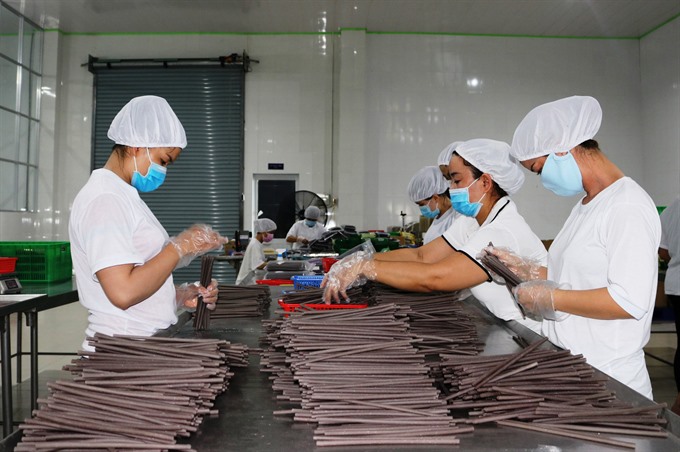Vietnamese companies making eco-friendly straws have received many orders from other countries that have reduced the use of plastic straws or even banned their production.

Rice flour made at the Bột (Flour) Village in Sa Đéc City in the Mekong Delta province of Đồng Tháp is used to make eco-friendly straws. – VNS Photo Ngọc Diệp
Eco-friendly straws include those made from bamboo, metal, glass, green grass and rice flour. Of these, bamboo, metal and grass straws are used mostly in Việt Nam.
Many young people are popularising the use of the eco-friendly straws and sharing information on their Facebook pages.
Sado Chado Việt Nam bubble-tea and food shops in HCM City, for example, attract many customers because of their rice flour straws, according to the shop’s Facebook page.
Last month, images and information about rice flour straws, for instance, were shared widely on Facebook, with many people showing interest.
Nguyễn Thị Thanh Thuận of the southern coastal province of Bà Rịa-Vũng Tàu wrote on Facebook: “I want to try use eco-friendly straws because I see too much plastic waste, including straws, thrown under trees on the way from my house to the company where I work. If these eco-friendly straws are sold at supermarkets, I will buy them.”
Võ Minh Khang, general director of Hùng Hậu Foods Co Ltd, said the company was using rice flour from the well-known Bột (Flour) Village in Sa Đéc City in the Mekong Delta province of Đồng Tháp as the main material for straws.
“The demand is getting higher here and in other countries, too. Young people here like this product,” Khang said.
The company is now producing five tonnes each day compared to one tonne in previous months, he said.
Many coffee chains in the country have ordered the rice flour straws, he said. “This product has also been ordered by many companies in South Korea, Russia, the US and Europe.”
“Rice flour straws can be preserved for 18 months at normal temperatures. It is better to use in cold and normal water. The time of use is for 30 minutes. After the time, straw becomes soft and can break.”
Tetra Pak, which provides processing and packaging solutions for food, plans to replace its plastic straws. It is testing paper to ensure food safety for consumers’ health before it begins making the new products, as part of a broader programme to help address the issue of plastic straw waste.
Many companies from other countries have come to Việt Nam to learn about manufacturing process and products, with the aim of importing them to their countries.
Korean visitors
INK Global Co Ltd in South Korea, which will ban disposable cups and plastic straws by 2027, visited a grass straw manufacturer in the Mekong Delta province of Long An last week.
Kim Bong Yong, the company’s CEO, said: “I saw this product in a hotel in Việt Nam. So I searched the name of the company and came to buy for the Korean market.”
The demand in South Korea has soared because of the country’s upcoming ban.
“These grass straws have good quality,” he added.
Nguyễn Ngọc Hòa, director of the Việt Nam-German Technology Centre at the HCM City University of Food and Industry, said by phone: “These eco-friendly straws should be encouraged because they’re safe for consumers. It’s very important that the materials used to produce these straws are ‘clean’.”
Nguyễn Thượng Hiền, of the Việt Nam Environment Administration’s Department of Solid Waste Management at the Ministry of Agriculture and Rural Development, told Tuổi trẻ (Youth) newspaper that the department is carrying out a project on reducing plastic waste, including single-use straws that are now being used at restaurants and coffee shops.
The country has nearly 2.5 million tonnes of single-use plastic products thrown away each year, Hiền said.
Việt Nam is one of the top five countries that throw away the largest volume of plastic waste on beaches, according to Stemming the Tide, a 2015 study by the Ocean Conservancy and McKinsey Centre for Business and Environment.
According to the Ocean Conservancy, a nonprofit environmental advocacy group in the US, eight million tonnes of plastics have entered the ocean. Around 43,000 plastic straws were picked up around beaches and waterways all over the world in a 2017 international coastal cleanup.
For A Strawless Ocean, an open-source resource developed by Lonely Whale of Social and Environmental Entrepreneur, found that straws were among the top 10 items found during beach cleanups. They can cause serious harm to seabirds, turtles and other marine life. — VNS